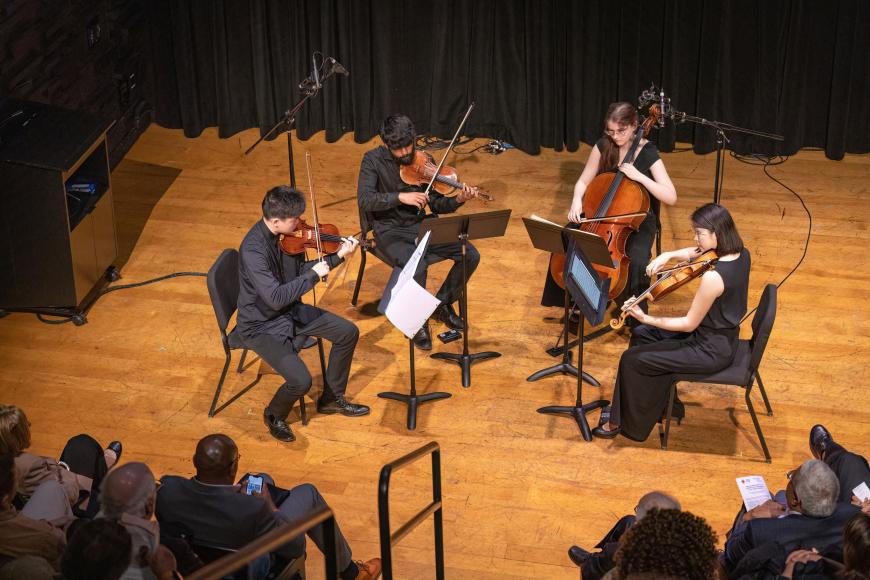
Music plays a role in virtually every phase of our lives. From the lullabies our mothers sing to us as infants to the enduring favorites we hum to ourselves in old age, music provides comfort, excitement, consolation, stimulation, joy.
These effects are not superficial or fleeting. In recent years, researchers have compiled compelling evidence that music impacts our brains in positive ways — especially at the beginning and end stages of our existences.
That was a theme of “Music on the Brain,” a concert and panel discussion that took place June 1 in Cammilleri Hall on the campus of the University of Southern California. A collaboration between classical radio station KUSC and the USC Brain and Creativity Institute, it can be streamed on KUSC.org.
“Music has great potential to help us understand we are all connected,” noted Vice Provost for the Arts Josh Kun, who has spent time speaking with migrants and refugees about the role music plays in their lives. Kun marveled at the fact that a piece of music created by one individual can feel so personal to another individual that they think of it as “my song.”

The event featured a quick, once-over-lightly review of research into music and the brain, as well as neurally stimulating performances of Dmitri Shostakovich and Antonín Dvořák string quartets by students from the USC Thornton School of Music. Panelists included some of the top researchers in the field, led by neuroscientist Antonio Damasio, director of the Brain and Creativity Institute.
“When you think about the power of music,” Damasio said, “part of it has to do with the fact we ourselves are like musical instruments,” in that our physical bodies respond to stimulation by generating physical effects that evoke feelings — sometimes quite intense ones.
Damasio and two USC researchers, psychologist Assal Habibi and music educator Beatriz Ilari, addressed two major areas of brain-music research, both of which could serve as the focus of future in-depth discussions: music’s impact on children’s developing brains and how music can help people cope with dementia in old age.

Habibi’s most extensive research project has focused on children and adolescents. In recent decades, numerous studies have shown that kids who study music outperform their peers in a variety of realms. The problem is it is difficult to discern whether these benefits are the result of the lessons themselves or if kids who choose to study music are simply sharper than their nonmusical schoolmates.
To try to answer this chicken-and-egg question, Habibi and her colleagues conducted an eight-year longitudinal study featuring underprivileged youngsters enrolled in a rigorous music education program, Youth Orchestra Los Angeles (YOLA). They followed the brain development of these children, who were 6 years old at the study’s start.
Their progress was periodically compared to two control groups: one featuring youngsters who took part in an organized soccer program and another whose kids were not involved with any organized after-school activities.
The researchers found music training accelerated the maturation of areas of the brain that not only dealt with sound processing but also language development, speech perception, and reading skills.
Habibi said that over time with the YOLA students, she and her colleagues “saw more active engagement in the frontal regions of the brain, which are responsible for decision-making, and more integration” between the two hemispheres of the brain. Because the kids in the study all started out on equal footing, here was proof, the researchers claimed, that music training made a real difference.

Ilari added that research has also found making music in groups improves children’s cooperative behavior and helps them develop stronger impulse control. “If you’re going to play with other people, you need to take turns,” she noted.
Moderator Gail Eichenthal of KUSC pointed out that there is a perplexing disconnect between these findings and the fact that music education continues to be either nonexistent or starved for funding in so many school districts. She pleaded for greater advocacy for music education — a call the panelists seconded.
Habibi added that it also makes sense for music to be incorporated more fully into care for the elderly. She pointed to research showing music “can help people with early-stage dementia retrieve memories,” particularly if the tune in question evokes an earlier, happier stage of one’s life.
Why is that? Damasio noted that, in the brain, the process of recalling music is very different from the process of retrieving information to answer a verbal question.
“Loss of memory is associated with very specific regions of the brain,” he said. Even if parts of that network are malfunctioning, the music-recall channel may be perfectly healthy.
“That’s one thing we can take advantage of,” he said. “Music is powerful.”




